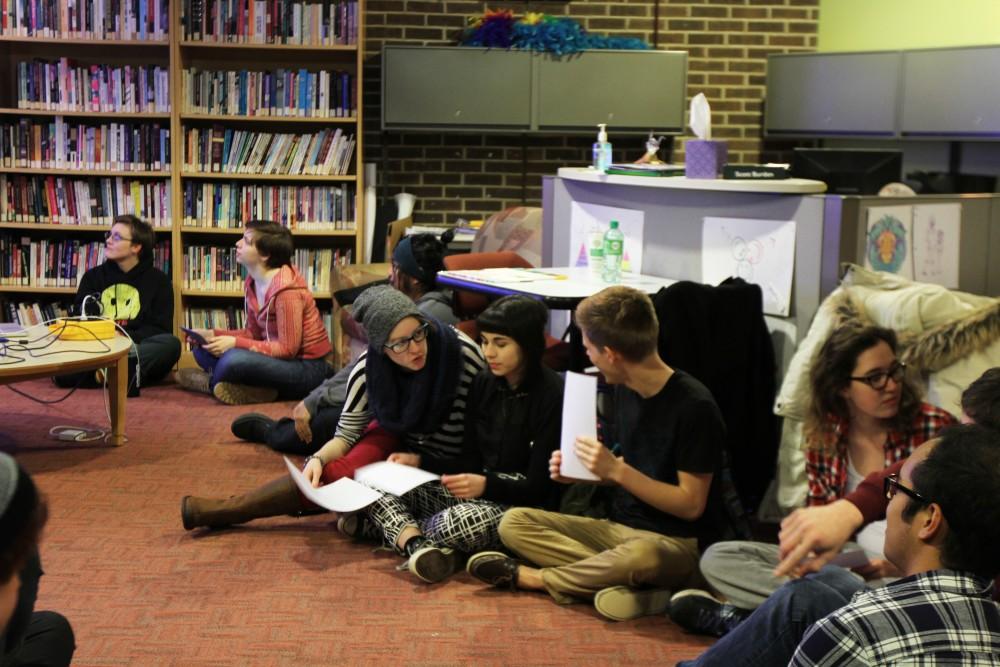Pride in poetry

GVL / Kasey Garvelink – Prior to beginning, students that attended the In the Margins event had time to talk with one another before the meeting started on Feb. 16, 2016 in Allendale.
Feb 18, 2016
The artist speaks as each word projects emotion, captivating every listener. Silence spreads across the room when the microphone drops. The artist leaves with a newly found energy while cheers erupt from the crowd.
Spoken word performances are a therapeutic method to communicate opinions and feelings. In marginalized communities, this self-disclosure is way of creating community and conversation within inclusive spaces.
For Grand Valley State University students Ashlyn Rowell and Erica Ruffner, creative writing was a vital role in their identity expression. After they hosted several informal poetry events on-campus, students involved requested more chances to speak out.
As a result, Ruffner and Rowell co-facilitated with the GVSU Milton E. Ford LGBT Resource Center, to create the In the Margins Poetry club. Marla Wick, assistant director of the LGBT Resource Center, acts as an adviser to the club.
“I began throwing poetry nights in my apartment, as a sort of informal student reading series,” Rowell said. “I wanted people to connect through their writings, and once-a-month poetry night offered this. However, this wasn’t enough.”
The LGBT Resource Center hosts one “Queer the Air” spoken word event every semester. Rowell, a sophomore at GVSU, said the event inspired the club while students enjoyed the creative inclusive environment.
“In The Margins focuses primarily on validation to create a nurturing writing environment,” she said. “Our priority is creating a safe space for writers to share their work in a supportive, constructive environment.”
Marginalized identities often face heteronormative and binary situations on campus at GVSU, Rowell said. Some students find it difficult to express identity without discrimination, such as assumptions about gender, race or sexual orientation.
“I’ve found in classes, and in other clubs on campus that heteronormativity often gets in the way of expression,” Rowell said. “From personal experience, I’ll write a love poem about a girl, and everyone assumes it’s about my mother or a friend because they assume I’m straight.”
Erica Ruffner, sophomore at GVSU and co-facilitator of the club, said her hope is the club will benefit other students going through similar struggles with self-identification.
“I personally value this club because I came out in a spoken word piece at ‘Queer the Air’ last year,” Ruffner said.
Sharing creative writing, she said, can be beneficial to finding validation and embracing emotions from personal experiences. She said students share anything from poems, to haikus and even powerful free-verse pieces.
“I found validation and support from the community following my performance,” Ruffner said. “Having a group of people embrace the deeply personal emotions and experiences I shared helped me accept myself, and feel confident in my identity as a queer woman.”
No writing experience is required, but Rowell said students should bring an open mind to the meetings.
“The privacy of members’ experiences and writings is incredibly important to us,” she said. “We have a no-outing policy, which dictates that what is said in the club must stay in the club, unless that person explicitly says it can be shared.”
While the club is just starting out, they hope to grow in membership in the fall.
“This club is a space where there are no assumptions,” Rowell said. “Every meeting we have at least one creative writing activity, which often includes magnet poetry.”
The club meets weekly on Tuesday at 8 p.m in the LGBT Resource Center in the Kirkhof Center. Anyone can join at any time during the semester.

























